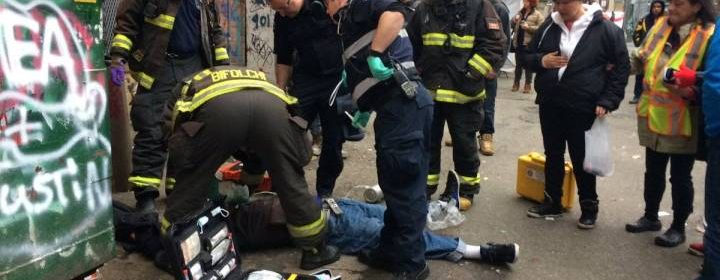As overdose deaths slow, Vancouver pilot project looks ahead to treatment

Health officials and Vancouver firefighters say early results of a new pilot project show promise as the next step in ending B.C.’s overdose crisis.
The pilot is a partnership between Vancouver Fire and Rescue Services (VFRS) and Vancouver Coastal Health’s (VCH) overdose outreach team, which has been operating since 2016.
Under the initiative, firefighters keep track of overdose cases they respond to. Then, along with a VCH outreach worker, they follow up with the overdose patient several days later to try and connect them to services.
Officials say out of 22 people who overdosed in a single week, 21 agreed to be introduced to the outreach team after a follow-up.
VCH Chief Medical Health Officer Dr. Patricia Daily said the region’s harm reduction strategies, including naloxone kits and supervised consumption sites, were working to cut down on the number of deaths from overdose.
Vancouver saw 144 overdose fatalities in the first six months of the year, a 26 per cent decrease compared to the same period in 2018 — but the city still has the highest overdose death rate in Canada.
Daly said the quantity of overdoses hasn’t slowed down. The pilot project, she said, was an attempt to take the next step and help people transition out of addiction.
“From the very start of this crisis we knew we wanted to engage people who survived an overdose and try and help them to receive treatment if they’re ready, to help them with other supports that could address the factors that led to their substance use,” she said.
Daly said the outreach team, which had been making contact with overdose patients in hospital emergency rooms, found that while people were often not ready to seek help in the ER, several days later they were often open to it.
However, Daly said many overdose patients never end up in hospital, but are instead treated and released in the field by paramedics and fire medics.
VFRS Capt. Jonathan Gormick said the initiative takes the overdose response beyond simply saving lives.
“What we need now is something to change lives,” said Gormick.
“This new partnership … bridges the gap between acute care and overdose reversal in the field and gives our women and men a new tool to improve a patient’s outcome, overall well-being, and starts to address fundamental needs instead of just symptoms.”
Gormick said firefighters were now compiling a list of overdose incidents twice weekly, and liaising with the outreach team to personally follow up with patients.
“We want to make sure they’re recovering … and offer an immediate connection to Coastal Health that could address any of the factors that put them at risk for a further overdose or simply improve the quality of their lives,” he said.
Vancouver Mayor Kennedy Stewart praised the initiative, which he said “provides light at the end of the tunnel” in the overdose crisis.
“This approach builds trust between people experiencing overdoses, responders and health professionals, with the hope that these new partnerships will end the cycle of overdoses that have taken a big toll on everyone,” said Stewart.
Since the overdose crisis was declared a public health emergency in B.C. in 2016, more than 3,600 people have died of suspected illicit drug overdoses.
Sign up for our Health IQ newsletter
© 2019 Global News, a division of Corus Entertainment Inc.
Source: Read Full Article

